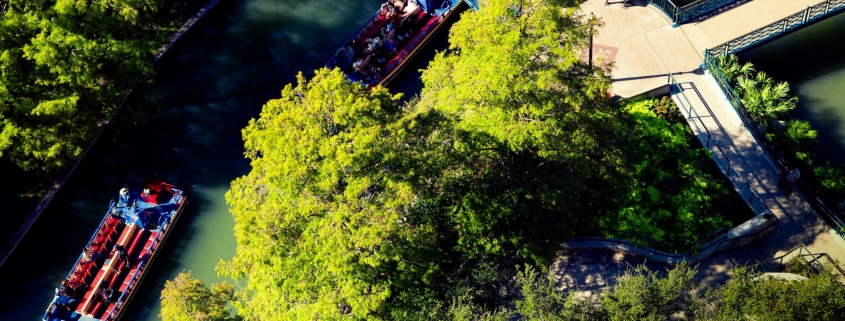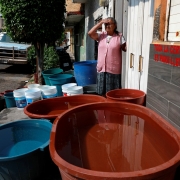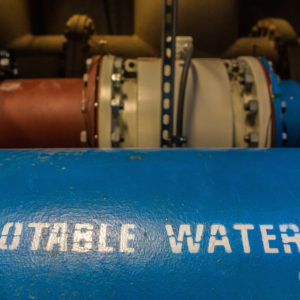Election 2019: State and Local Voters Face Water Infrastructure Funding Decisions
Ballot initiatives in Colorado, Texas, New Orleans, and Portland address flooding, financing, and watershed protection.

The San Antonio River flows through downtown San Antonio, and is protected by a flood control system that includes dams and a water-retaining tunnel. A ballot measure in Texas proposes putting $800 million in state funds toward flood protection. Photo © J. Carl Ganter/Circle of Blue
By Brett Walton, Circle of Blue
Few questions loom larger in politics than those about funding. When those funds are state bond outlays, often the question is put to the voters in a ballot initiative.
This year is no different. Voters in Colorado, Texas, and New Orleans have a chance in November to weigh in on water infrastructure funding.
In Colorado, the question is whether to legalize sports gambling and use most of the revenue to support the state’s water plan.
In Texas, voters will be asked to authorize a nearly $800 million flood infrastructure fund and $200 million in bond funding for water projects in poor communities.
Flood response is also a cornerstone issue in New Orleans, where city voters will consider a ballot measure authorizing $500 million in spending on public works projects, including drainage and stormwater management.
In Portland, Oregon, meanwhile, the question is whether to enshrine watershed protections in the city charter.
Water infrastructure bonds tend to be popular with voters.
Sri Vedachalam, director of water at the Environmental Policy Innovation Center, has tracked state-level water infrastructure ballot initiatives for several years. According to his data, which he cautions is not complete, 35 out of 39 water infrastructure initiatives have passed since 2001.
State Initiatives
Colorado: Proposition DD
Proposition DD links two fraught topics: gambling and water in the American West.
If approved, the proposition will legalize sports betting in Colorado and levy a 10 percent tax on the proceeds. Most of the tax revenue will be directed to the Colorado Water Conservation Board, to fund projects outlined in the state water plan, which was published in 2015 after two years of public consultation.
Revenue generated by legalized sports betting will initially be small, and quite small compared to the sums envisioned for the state water plan, which could cost as much as $40 billion to implement. Most of that is covered by existing funding, but there is still a projected gap of roughly $3 billion over 30 years.
The state forecasts about $16 million in annual revenue from sports betting, averaged over the first five years. Under the law’s allocation formula, some 93 percent of that sum, or $14.9 million, would be allocated to water projects. The maximum amount of tax revenue the state can draw is $29 million per year.
The proposition has wide backing. Eighty-five of the state’s 100 lawmakers voted in favor of putting the measure on the ballot. Many environmental groups have signaled their support, including American Rivers, Environmental Defense Fund, and Trout Unlimited. Urban water utilities like Denver Water are also on board.
A few environmental groups, however, oppose Prop. DD because they see the water plan as a backdoor to funding more dams and water diversions in river systems that are already overdrafted and will see additional depletion as the planet warms and the region dries out. The fact that money is not designated for specific purpose also gives them pause.
“This is socially and environmentally irresponsible, and we stand firmly against it,” Jen Pelz of WildEarth Guardians told the Colorado Sun.
Texas: Proposition 8
With fresh memories of flooded highways and ruined homes from heavy rains during Hurricane Harvey and Tropical Storm Imelda, Texas voters will be asked to authorize a state flood prevention and recovery fund. The fund will be seeded with nearly $800 million from the state’s surplus revenue.
Proposition 8 will amend the state constitution to create the flood infrastructure fund. Lawmakers earlier this year sent the amendment to the November ballot.
Rep. Dade Phelan, who introduced the measure, said the fund will help develop regional solutions to flood protection. He said one of the advantages of the fund, which is directed at local governments, is the ability to allocate money quickly to worthwhile projects.
“When it takes the feds years to even get your money, and the state’s going to do it in a matter of months — I mean, it’s pretty impressive how much quicker we’re going to move,” Phelan, a Republican, told the Texas Tribune.
The funds will be administered by the Texas Water Development Board and cannot be tapped by the Legislature. The board will score and rank project proposals before handing out funds.
Proposition 8 has widespread support, including both Democratic and Republican lawmakers. The editorial boards of all the state’s major newspapers have endorsed it, as well.
Texas: Proposition 2
Texans will also be voting on a $200 million bond measure to support drinking water infrastructure in poor communities.
Proposition 2 expands the Economically Distressed Areas Program, an existing water infrastructure program that was established in 1989 but has run out of money. The measure also allows new types of projects to be funded, such as drainage systems to deal with flooding.
Under the measure, the Texas Water Development Board will be authorized to issue up to $200 million in bonds. Places eligible for funding are those where the median household income is no more than 75 percent of the state median and where water and sewer service is inadequate or does not exist.
Proposition 2 has less political support than Prop 8. More than a third of Republicans in the Texas House of Representatives voted against putting the measure on the ballot, and eight of 19 Republicans in the Senate opposed it. The measure had unanimous support from Democrats, though.
Public opinion, however, seem to be aligning in favor. Like for Prop. 8, the editorial boards of all the state’s major newspapers have endorsed it.
Local Initiatives
New Orleans: Bond Proposition
When it rains in New Orleans, it often floods.
In a special election on November 16, New Orleans voters will decide whether to authorize city officials to issue $500 million in bonds to upgrade infrastructure. Improving antiquated stormwater drainage is a significant component, but funds will also be targeted at affordable housing, bridges, libraries, and parks.
The initiative is part of a package of spending proposals from Mayor LaToya Cantrell that she calls the “fair share,” which means directing more tourist revenue into repairing the beloved city’s worn out public works.
Portland, Oregon: Measure 26-204
Voters in Oregon’s largest city will decide whether to amend the city charter to include protections for the watershed that provides municipal drinking water.
City code already restricts public access, logging, development, and certain other land use activities within the Bull Run watershed, which is east of the city, in the Cascade Mountains. But environmental groups worry about a potential vulnerability: the code can be rewritten by the City Council. This measure adds the watershed protection rules to the city charter, which can be changed only by public vote.
“Protecting the Bull Run Watershed is crucial for the City’s work to address climate disruption and responsible forest management,” argues Commissioner Amanda Fritz, who sponsored the charter amendment.
Portland is one of the few large cities that does not filter its drinking water. For decades, state health officials have granted the city a waiver, due in large part to the protected watershed. But after finding the parasite cryptosporidium in the watershed, that exemption has ended. The Portland City Council voted two years ago to build a $500 million filtration plant that is scheduled to be completed in 2027.
The charter amendment has overwhelming support, with endorsements from The Oregonian, which is the state’s largest newspaper, and environmental groups. No arguments in opposition were filed with the Multnomah County Elections Division.
Brett writes about agriculture, energy, infrastructure, and the politics and economics of water in the United States. He also writes the Federal Water Tap, Circle of Blue’s weekly digest of U.S. government water news. He is the winner of two Society of Environmental Journalists reporting awards, one of the top honors in American environmental journalism: first place for explanatory reporting for a series on septic system pollution in the United States(2016) and third place for beat reporting in a small market (2014). He received the Sierra Club’s Distinguished Service Award in 2018. Brett lives in Seattle, where he hikes the mountains and bakes pies. Contact Brett Walton












Leave a Reply
Want to join the discussion?Feel free to contribute!